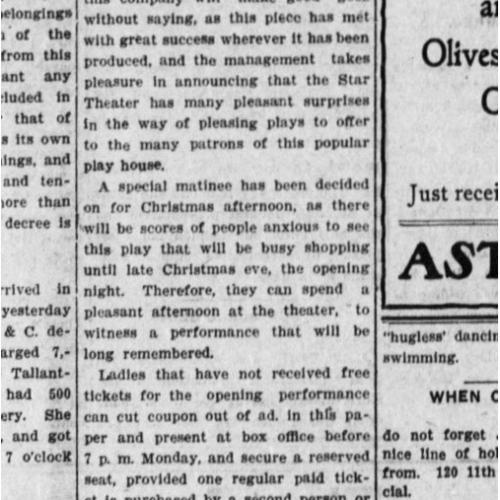Christmas time has always been known as the busiest time of year for retail stores and people's schedules. The Star theater in Astoria, Oregon found their opening night on December 24th, 1906 as a promotional strategy. The theater used the local paper, called The Morning Astorian, to promote their opening by offering a free ticket to women who cut out the ad as long as they had someone with them who bought a ticket to the movie. They also introduced the benefits of coming on such a busy day for consumers, mentioning “pleasant afternoon in the theatre” regarding the stress that comes along during Christmas Eve shopping. Movies are famously released around Christmas time due to the increase of sales according to CNBC “On average, the week between Christmas Eve and New Year’s Eve equates to between $400 million and $600 million in ticket sales.” This increases mainly due to the Christmas vacation, that most people are allowed during the year. This is even shown with the world's biggest franchise “Star Wars” which release their movie during Christmas time .Creating this promotional strategy during Christmas not only single attracts viewers but it also attracts families as they will be buying tickets in higher quantity. This even relates to me as my family during Christmas afternoon goes out to the movies each year. Besides the fact the promotional strategy around the holiday season. This helped women's rights as they were not given any respect or valid rights at the time. Without much respect you would think that in 1906 that a screenplay titled “a woman's struggle” would not do that well but if anything this could have been a catalyst for giving their right to vote. This promotional strategy has shown that theaters just don't do better in December but at such a great discount this was strategically placed to help women's rights. Who would’ve thought that a small town in Oregon could create the opportunity for women's rights.
Promotional Strategies through Christmas Shopping and Women Bonding
Feb
15
2020
Categories
- The Morning Astorian, December 23, 1906, Page 4
